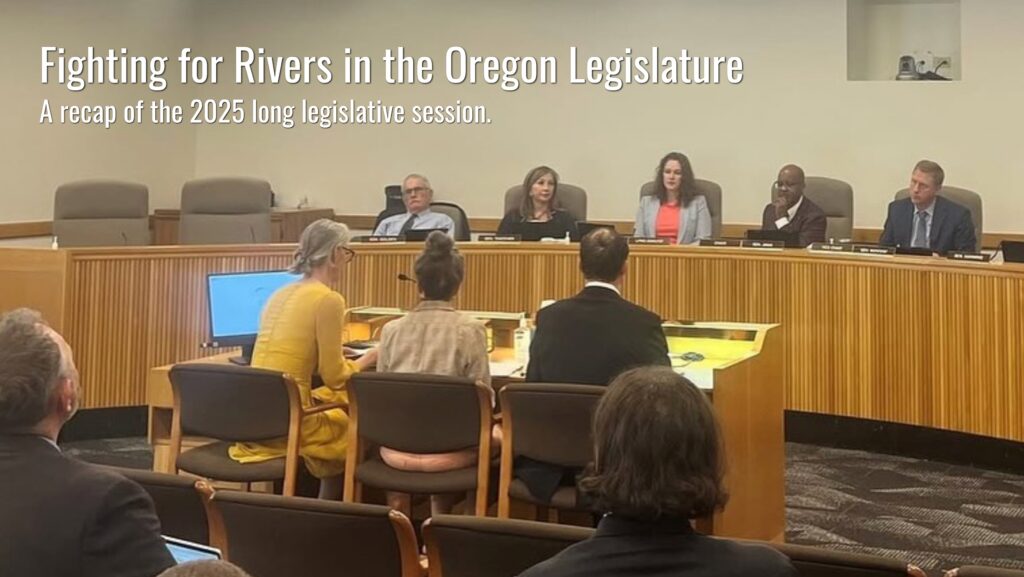A recap of the 2025 long Oregon legislative session in Salem.
By Kimberley Priestley, WaterWatch Senior Policy Advisor
WaterWatch has been a dogged voice for rivers in the Oregon legislature for the past 40 years, and 2025 was no different as we tirelessly advocated for rivers in deliberations on over 120 water bills, a dozen rule bills, and two agency budgets.
Unfortunately, the sheer number of bills and often hyperbolic messaging accompanying them made rational debate over most bills in 2025 challenging. But despite the difficult pace and tenor, WaterWatch helped pass common sense proposals that allow for more sustainable water management and better protection of our rivers and aquifers. Water agency budgets also remained whole, ensuring the gains made over the past decade were not compromised during these uncertain financial times. WaterWatch worked relentlessly to ensure harmful water bills were either amended to an acceptable state, or killed altogether. A sampling of water-related legislative initiatives include:
Environmental Review of Water Right Transfers
An unintended regulatory loophole in Oregon’s water transfer laws allows old water rights to serve new uses, move diversion points, or change the place of use without any environmental review. To address this, the Oregon Water Partnership (OWP), which WaterWatch is a member of, brought SB 427 to establish a “no diminishment of flow” standard for transfers, and Governor Kotek brought SB 1153, which focused on protecting fish and wildlife habitat and water quality. Both bills were sent to the Senate Rules Committee, a workgroup debated them for weeks, and the concept was significantly narrowed to apply only to changes that move diversion points upstream or wells within a quarter mile of a stream.
Unfortunately, politics prevailed over substance. In the last days of the session, we understand that because SB 1153 had landed on the Republican “walk out” list — a tactic in which Republican lawmakers who oppose bills choose not to appear for votes in order to deny Democrats a sufficient quorum of members to conduct business — the bill was sacrificed to keep Republican legislators in the building.
That said, given the increasing use of transfers to fuel new development, ensuring environmental review of transfers will continue to be a priority in future sessions.
Boosts to Water Management
While improving water management was a focus of the 2025 session, some common sense tools such as measurement and reporting (HB 3419, HB 3343) unfortunately fell by the wayside because of disinformation voiced by the opposition.
However, one bill that largely flew under the political radar brought some of the most significant legislative gains for water in decades. Under HB 3342, the state cannot accept new water right applications in protected groundwater areas or from withdrawn streams, meaning these areas will not only will be safeguarded from further harm, but applicants will no longer be able to challenge the Oregon Water Resources Department (OWRD) in court for denying a water right application, thereby saving the state significant resources. HB 3342 also protects groundwater-restricted areas in water right transfer processes, marking the first change to Oregon’s transfer laws that allows rejection based on resource concerns. The bill also narrows the ability of water rights holders to extend the time to develop a water right, which will curb water speculation.
Protection of Wildlife Helps Oregon Rivers
WaterWatch lent support to two wildlife bills this session for their ancillary benefits of helping rivers and streams. HB 3932, which passed, prohibits commercial and recreational killing of beavers on water quality limited streams that run through public lands. This will benefit Oregon’s rivers as beaver dams reduce pollutants by filtering streamflows, create ponds that saturate floodplains, and encourage healthy streamside vegetation. Unfortunately, HB 2977, which would have collected a 1.25 percent charge on transient lodging to fund fish and wildlife protection work of the Oregon Department of Fish and Wildlife (ODFW), died in the last days of the session because of timing issues resulting from Republican opposition.
Protecting Agency Budgets from Cuts
Maintaining current service levels in unpredictable financial times was a priority for WaterWatch in the 2025 session, and the legislature agreed. The Oregon Department of Fish and Wildlife’s Water Program remained unscathed, ensuring the agency’s current work to protect and restore streamflows, including the securing of new instream water rights, will continue uninterrupted. Similarly, the legislature retained most positions at OWRD, boosted legal funding, and rejected proposed cuts to groundwater studies, water measurement, and other important data.
Bad Bills That Would Have Harmed Streamflows, Compromised Aquifers, and Destroyed Aquatic Habitat Failed to Get Traction
Without fail, every session brings a slew of dangerous water bills that threaten Oregon’s waters. This year was no exception, and WaterWatch led the effort to kill bills that would have undermined the state’s ability to manage groundwater (HB 3801, HB 3800), narrowed state review of limited licenses (HB 3108), prohibited dam removal (HB 3739), circumvented Columbia River flow protections (SB 673, SB 674), targeted Winchester Dam (HB 3728), allowed habitat destruction in the name of restoration (SB 511), allowed certain ponds without a water right permit (HB 3128), prohibited the consideration of public interest factors in transfers (HB 3501), exempted projects from state removal fill permits (SB 400), and disrupted use of agency data (SB 775), among others.
While all these bills died, HB 3374, which expands exempt groundwater uses to irrigation of commercial farms of one-half acre or less with no allowed advanced review of the effect on streamflow, aquifers, or other water rights, regrettably passed. We also negotiated a slew of other bills to an acceptable state, including those related to water reuse (HB 2169), a Deschutes water bank (HB 3806), Oregon’s water project development fund (HB 3364), and contested case hearings (HB 3544).
Misguided Rules Bills That Sought to Undermine Executive Branch Powers Largely Failed
Following the federal trend of blurring the lines between the three branches of government and giving regulated entities a leg up in hindering regulation, this session saw around a dozen bills aimed at undermining Oregon’s regulatory framework that would have had an outsized impact on water. These ranged from granting legislators veto power over rules to legislative investigation of agency actions and programs. All these bills were disconcertingly similar to model rules developed by the conservative American Legislative Exchange Council (ALEC) that works to influence legislation primarily in conservative states.
All in all, while we were disappointed the environmental review of water right transfers stalled, we are nevertheless celebrating that Oregon’s rivers gained more protections in 2025, agency work to protect our waters will continue uninterrupted, and environmental regulations withstood rollbacks. Thank you to all of our members who engaged on bills and budgets and made these successes possible.

Banner photo and central triptych photo of Oregon Water Partnership testimony courtesy of Wild Salmon Center.
Left-hand triptych photo with Kimberley Priestley (center) and Oregon Water Partnership colleagues courtesy of Wild Salmon Center.
Right-hand triptych photo with Senator Floyd Prozanski featuring Kimberley Priestley (second from left) and WaterWatch contract lobbyist Jack Dempsey (third from left) courtesy of Senator Prozanski’s office.
This article originally appeared in the summer 2025 issue of WaterWatch of Oregon’s Instream newsletter.


